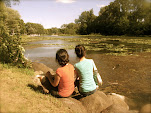Notes on Burckhardt
在長途汽車上讀的,草草翻譯一下。
布克哈特(Jacob Burckhardt)致尼采,1874
"I have done everything I possibly could to lead them on to acquire personal possession of the past---in whatever form---and at least not to sicken them of it; I wanted them to be capable of plucking the fruits for themselves; I never dreamed of training scholars and disciples in the narrower sense, but only wanted to make every member of my audience feel and know that everyone may and must appropriate those aspects of the past which appeal to him personally, and that there might be happiness in doing so."
The Civilisation of Renaissance in Italy, trans. S.G.C. Middlemore, pp. 204-5, part III:
"The career of the humanist was, as a rule, of such a kind that only the strongest characters could pass through it unscathed. The first danger came, in some cases, from the parents, who sought to turn a precocious child into a miracle of learning, with an eye to his future position in that class which then was supreme. Youthful prodigies, however, seldom rise above a certain level; or, if they do, are forced to achieve their further progress and development at the cost of the bitterest trials. For an ambitious youth, the fame and brilliant position of the humanists were a perilous temptation; it seemed to him that he, too, 'through inborn pride, could no longer regard the low and common things of life.' And so he plunged into a life of excitement and vicissitude, in which exhausting studies, tutorships, secretaryships, professorships, office in princely households, mortal enmities and perils, luxury and beggary, boundless admiration and boundless contempt, followed confusedly one upon the other, and in which the most solid worth and learning were often pushed aside by superficial impudence. But the greatest evil was that the position of the humanist was almost incompatible with a fixed home, since it either made frequent changes of dwelling necessary for a livelihood, or so affected the mind of the individual that he could never be happy for long in one place. ...
"(t) The scholar of the Renaissance was forced to combine great learning with the power of resisting the influence of ever-changing pursuits and situations. ... Such men cannot exist without an inordinate pride. They needed it, if only to keep their heads above water, and were confirmed in it by the deification mixed with hatred that was their lot. They are the most striking examples and victims of an unbridled subjectivity."
布克哈特(Jacob Burckhardt)致尼采,1874
"I have done everything I possibly could to lead them on to acquire personal possession of the past---in whatever form---and at least not to sicken them of it; I wanted them to be capable of plucking the fruits for themselves; I never dreamed of training scholars and disciples in the narrower sense, but only wanted to make every member of my audience feel and know that everyone may and must appropriate those aspects of the past which appeal to him personally, and that there might be happiness in doing so."
“我已經盡我所能,教他們(學生?)自己去掌握過去--隨便以甚麼形式--而且至少不讓他們厭煩。我想要讓他們能夠自己擷取果實。我從來沒有夢想過訓練出嚴格意義上的學者和生徒,只是想要讓我的每個讀者都感到、並且明白每個人都可以且必須掌握過去之中那些訴諸他們自身的東西,而這個過程可以是幸福的。”
The Civilisation of Renaissance in Italy, trans. S.G.C. Middlemore, pp. 204-5, part III:
"The career of the humanist was, as a rule, of such a kind that only the strongest characters could pass through it unscathed. The first danger came, in some cases, from the parents, who sought to turn a precocious child into a miracle of learning, with an eye to his future position in that class which then was supreme. Youthful prodigies, however, seldom rise above a certain level; or, if they do, are forced to achieve their further progress and development at the cost of the bitterest trials. For an ambitious youth, the fame and brilliant position of the humanists were a perilous temptation; it seemed to him that he, too, 'through inborn pride, could no longer regard the low and common things of life.' And so he plunged into a life of excitement and vicissitude, in which exhausting studies, tutorships, secretaryships, professorships, office in princely households, mortal enmities and perils, luxury and beggary, boundless admiration and boundless contempt, followed confusedly one upon the other, and in which the most solid worth and learning were often pushed aside by superficial impudence. But the greatest evil was that the position of the humanist was almost incompatible with a fixed home, since it either made frequent changes of dwelling necessary for a livelihood, or so affected the mind of the individual that he could never be happy for long in one place. ...
"(t) The scholar of the Renaissance was forced to combine great learning with the power of resisting the influence of ever-changing pursuits and situations. ... Such men cannot exist without an inordinate pride. They needed it, if only to keep their heads above water, and were confirmed in it by the deification mixed with hatred that was their lot. They are the most striking examples and victims of an unbridled subjectivity."
“大致上,人文主義學者的生涯是只有性格最強大的那些人才能安然無恙地經受的。最開始的危險來自於家長,他們總想把一個早熟的小孩變成一個學習奇蹟,著眼於安排他將來進入那個當時地位最優越的階層。可是年幼的神童們很少能上昇到某個高度以上,即使他們做到了,也會被迫以經受最痛苦的考驗來換取更多的進展。對一個有野心的年輕人來說,一個人文主義學者的聲譽和地位是一種危險的誘惑,好像他也‘由於天生的驕傲,從此看不起生活中的塵微瑣事’。於是他一頭撲進充滿刺激和起伏的人生中,苦學、教課、做文書工作、當教授、服事王室家族、結下死對頭、奢華與窮困、無邊際的豔羨和無邊際的鄙夷,所有這些都一個接一個地出現,令人困惑,而最堅實的學識與價值反而被肆無忌憚地擱到一旁。但最糟糕的問題是:人文主義學者的職位幾乎不可能與一個固定的家庭相容,因為他要麼為生計被迫不停更換工作,要麼心智出問題,幾乎不可能在一個地方長時間地保持開心。⋯⋯
“文藝復興時期的學者被迫把偉大的學識和抗拒層出不窮的欲求和境遇的力量結合在一起。⋯⋯這樣的人不可能存在,除非保有超常的自豪感--他們需要這個,哪怕只是為了不致沈沒,並且這種自豪感會被給予他們的那攙雜著仇恨的神化崇拜不斷證實。他們是不被羈絆的主體性極大發揮的例子與犧牲品。”


0 Comments:
Post a Comment
Subscribe to Post Comments [Atom]
<< Home